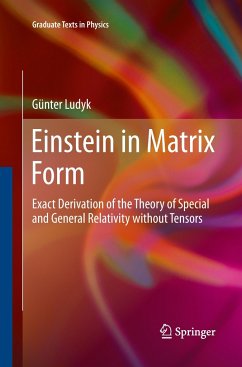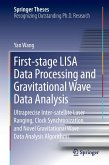This book is an introduction to the theories of Special and General Relativity. The target audience are physicists, engineers and applied scientists who are looking for an understandable introduction to the topic - without too much new mathematics. The fundamental equations of Einstein's theory of Special and General Relativity are derived using matrix calculus, without the help of tensors. This feature makes the book special and a valuable tool for scientists and engineers with no experience in the field of tensor calculus. In part I the foundations of Special Relativity are developed, part II describes the structure and principle of General Relativity. Part III explains the Schwarzschild solution of spherical body gravity and examines the "Black Hole" phenomenon. Any necessary mathematical tools are user friendly provided, either directly in the text or in the appendices.
From the book reviews:
"Addressing physicists, applied scientists and engineers with no previous knowledge of tensor calculus, Ludyk ... presents in a well-written manner a rather easy introduction to special as well as general relativity by solely using matrix calculus and elementary differential geometry. ... It is more than certain that Ludyk's treatment will make it possible for a larger number of students to get acquainted with special and general relativity theory at an introductory, undergraduate level." (Theophanes Grammenos, Mathematical Reviews, April, 2014)
"The main audience for this book can be ... those who have experience with practical calculations by use of matrices and vectors, but who have not the time to become familiar with tensor calculus. ... this book presents essentially all ingredients what one expects from a book aimed to introduce special and general relativity ... ." (Hans-Jürgen Schmidt, zbMATH, Vol. 1272, 2013)
"Addressing physicists, applied scientists and engineers with no previous knowledge of tensor calculus, Ludyk ... presents in a well-written manner a rather easy introduction to special as well as general relativity by solely using matrix calculus and elementary differential geometry. ... It is more than certain that Ludyk's treatment will make it possible for a larger number of students to get acquainted with special and general relativity theory at an introductory, undergraduate level." (Theophanes Grammenos, Mathematical Reviews, April, 2014)
"The main audience for this book can be ... those who have experience with practical calculations by use of matrices and vectors, but who have not the time to become familiar with tensor calculus. ... this book presents essentially all ingredients what one expects from a book aimed to introduce special and general relativity ... ." (Hans-Jürgen Schmidt, zbMATH, Vol. 1272, 2013)
From the reviews:
"The main audience for this book can be ... those who have experience with practical calculations by use of matrices and vectors, but who have not the time to become familiar with tensor calculus. ... this book presents essentially all ingredients what one expects from a book aimed to introduce special and general relativity ... ." -- Hans-Jürgen Schmidt, zbMATH, Vol. 1272, 2013
"The main audience for this book can be ... those who have experience with practical calculations by use of matrices and vectors, but who have not the time to become familiar with tensor calculus. ... this book presents essentially all ingredients what one expects from a book aimed to introduce special and general relativity ... ." -- Hans-Jürgen Schmidt, zbMATH, Vol. 1272, 2013









